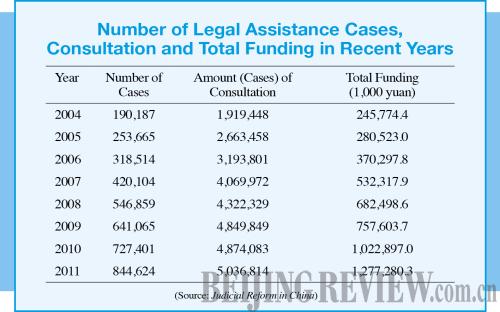|

In the five-chapter white paper, one third falls under a chapter entitled, "Enhancing the Protection of Human Rights." It says that enhancing human rights protection is an important task of the judicial reform plan.
Human rights protection was included in China's Constitution in 2004. One year ago, the death of 27-year-old Sun Zhigang rocked the country. On March 30, 2003, the aspiring fashion designer was savagely beaten to death by eight patients at a penitentiary hospital after being detained as a vagrant for not carrying an ID with him on his way to an Internet cafe. Since Sun worked in Guangzhou, south China's Guangdong Province, a city more than 1,000 km from his hometown in central Hubei Province, his detention was justified by the Measures for Internment and Deportation of Urban Vagrants and Beggars, an administrative regulation promulgated by the State Council, or China's cabinet, in 1982.
The loss of Sun's young life drew a torrent of online sympathy and questioning over the validity of the internment regulation, as the Legislation Law stipulates that any provisions concerning deprivation of the human rights and democratic rights of citizens must be made in the form of laws by the National People's Congress or its standing committee.
Forty days after Sun's death, the internment regulation was abolished. In March 2012, the phrase "respecting and protecting human rights" was written into the first chapter of the revised Criminal Procedure Law as one of its basic aims and principles.
When the police announced the head trauma that killed 24-year-old Li Qiaoming, who was briefly incarcerated on charges of illegal logging in Jinning County, southwest China's Yunnan Province, was caused accidentally by inmates during a game of "hide-and-seek" in February 2009, a public uproar ensued. Li's father, who viewed his son's corpse, told local media that Li's head was swollen and his body was "covered with purple abrasions" that were inconsistent with the police report.
Later investigations overseen by a commissioner from the Supreme People's Court revealed that Li was killed by three cellmates who, after beating him, fabricated the hide-and-seek story. Several police officers were also removed or punished for negligence.
The public outrage provoked by Li's death highlighted the need to improve oversight of courts and prisons to prevent bullying, torture, unjustified detentions and other abuses of human rights of the accused.
To protect detainees from physical abuse, a body surface examination has been conducted on a detainee daily within seven days after he or she is sent to a house of detention. This examination system is also strictly implemented before and after a round of interrogation, as well as before and after a detainee is sent away from or back to a house of detention, according to the government white paper.
Amendment Eight to the Criminal Law, which went into effect in May 2011, eliminates the death penalty for 13 economy-related non-violent offenses, accounting for 19.1 percent of the total death penalty charges.
The amendment also stipulates that the death penalty shall generally not be used for people who are already 75 years old at the time of trial.
China also revised laws to provide a legal guarantee for lawyers to meet with suspects or defendants, access case materials and obtain evidence through investigation.
According to the white paper, from 2006 to 2011, lawyers throughout the country provided defense in 2.4 million criminal cases, up 54.16 percent over the period between 2001 and 2005.
China has gradually extended its coverage of legal assistance since 2003, and established and improved its funding guarantee system, providing free legal services for citizens with economic difficulties and parties to special cases of lawsuits, stated the white paper.
The white paper shows that the number of legal assistance cases totaled 844,624 in 2011, and more than doubled that in 2007.
The daily state payment for infringement upon a citizen's right to freedom was increased from 17.16 yuan ($2.74) in 1995 to 162.65 yuan ($26) in 2012, according to the white paper.
The State Compensation Law amended in 2010 establishes necessary offices responsible for state compensation, opens up the channels for claiming compensation, expands the compensation scope, specifies the burden of proof, adds compensation for psychological injury, increases the compensation standards, and guarantees the timely payment of compensation.
According to the white paper, attempts are made to offer inmates vocational training in order to enhance their ability to make a living after being released.
Since 2008, a total of 1.26 million inmates have completed literacy and other compulsory education courses while serving their sentences, and more than 5,800 people have acquired college diplomas recognized by the state, it added.
Email us at: lili@bjreview.com
| 